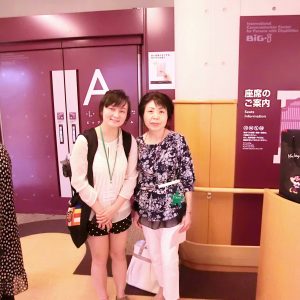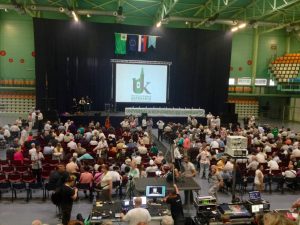In conversation with Alice Frederick ‘17
I sat down last week over tea with Yun-Yun Li and Alice Frederick, who each did fieldwork last summer in foreign cultures and outside of their mother tongues. Last week, I shared Yun-Yun’s insights on finding a meaningful research question and working through self-doubt. This week, Alice takes us to another continent and another research topic. Here, she reflects on conducting fieldwork in a new language, and finding her feet as an autonomous researcher.

Alice is an Anthropology concentrator investigating the past and present of the international community of Esperanto speakers. She spent portions of her summer at – among other places – the central office of the Universal Esperanto Association in the Netherlands, and the Austrian National Library’s Department of Planned Languages in Vienna. Here are some excerpts from our conversation.
Zoe: Alice, tell me about your research question – what do you study, and how did you find your question?
Alice: I’m interested in the contemporary culture surrounding Esperanto – an international language intended by its inventor to be the second language of the world…meant to be a language that helps everyone realize their common humanity.
I wanted to investigate how people can establish a community that’s not geographically bound. What does it mean to have a culture without a place – a culture built entirely on a language?
Zoe: Wow, what an amazing question. What was it like for you to be conducting fieldwork in a new language?
Alice: I was not good at Esperanto at the beginning of the summer. I really can’t believe the audacity I had. I went to the central office, and I met the General Director of the Universal Esperanto Association – like, the world Esperanto Association! – and she took me out to lunch. She sat across from me, smiling, and waiting for me to use Esperanto…and I couldn’t say anything!
“I really can’t believe the audacity I had.”
…But I spoke, very slowly. After that week I felt somewhat more confident, and then I went to a few congresses, one in Japan and one in Slovakia, in June and July. There were still moments where I would freeze up, but for the most part I understood everything.
Zoe: What was the most challenging part of your fieldwork for you?

Alice: Ethnography doesn’t demand that I have a definitive question as I’m doing fieldwork – in some ways, it’s almost just as happy if I develop my research question after the fieldwork is completely over. But this left me feeling kind of lost. I remember especially at the Esperanto World Congress – the last place I went, of all places – feeling kind of bewildered. What thread do I follow here?…there were a lot of questions I could have had, and I wasn’t sure what to latch on to.
“I remember at the Esperanto World Congress – the last place I went, of all places – feeling kind of bewildered. What thread do I follow here?”
This reminds me of Yun-Yun’s story – her first weeks in China of questioning, thinking, immersing herself – but not yet knowing what the right question was.
Zoe: So when you were there at the World Congress, thinking, “What am I doing?” – how did you work through that?
Alice: Actually, the Esperanto speakers themselves made it pretty easy for me to deal with it, because they gave me so much information about Esperanto…I do remember really wishing I had an adviser, someone I could spill all this to. But even now that I have one, I think they want me to have this kind of independence of thought. I don’t know that having an adviser would have actually given me any more confidence at the time.
Zoe: I know what you mean…and in a way that’s the beautiful thing about the thesis: you can find a topic narrow enough that it really is entirely yours. Nobody else at Princeton – and possibly nobody else in the world – understands this specific topic as well as you do. People will be supportive, but certainly nobody cares about it as much as you! It’s kind of terrifying – but also so empowering.
This reminds me again of something Yun-Yun said: the real substance of your project and your motives behind it are yours. This is very different from the traditional classroom educational experience, and was incredibly fulfilling for me, Yun-Yun, and Alice. The challenges of fieldwork lay the ground from which we grow.

